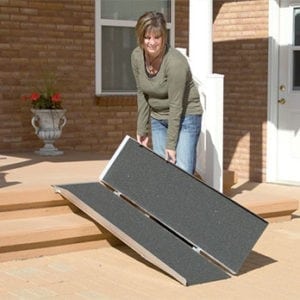Healthy Living

Let’s face it, most individuals will need to research a ramp at some point in their lives. Whether for a visiting friend, temporary use after a surgery, an older relative who is struggling with stairs, or one of numerous other scenarios, we will likely all find ourselves involved in the decision-making process. So, the folks here at 101 Mobility of Alabama have created a handy guide to help you choose the right ramp.
How Much Ramp do I Need? The length of ramp required is dependent on the rise measurement – the measurement from the top step or landing to the ground. According to ADA guidelines, ramps should adhere to a 1:12 ratio, meaning for every 1 inch of rise, the ramp should extend 12 inches in length. The guidelines also require that ramps have a minimum width of 36″, as well as a level platform at the top and bottom. These guidelines help to ensure that ramps are safe for all users, with a reasonable slope and safe width.
Wood vs. Aluminum. The next step in selecting your ramp is determining which material to choose. Let’s see how the two most common materials stack up.
Price. Price is typically based on the length of ramp required and may vary by city. The main thing to factor here is maintenance as wood needs to be re-stained every few years, and rotten boards replaced. With the proper tools and skill set, it is possible for some handy individuals to build wooden ramps on their own, which would certainly decrease the installation cost, and not require professional installation. However, many individuals are not qualified to perform this type of work, and would still encounter various costs regarding materials, permitting, and time spent on labor. Alternately, an aluminum ramp is very durable, and requires minimal maintenance.
Time. The time it takes to construct a ramp varies based on the material, length, and configuration required. Building a simple wood ramp of about 30 feet would take a contractor anywhere from two days to one week including time spent pouring concrete, cutting and assembling the wood, and staining the ramp to protect it from the elements. Installing a 30-foot modular aluminum ramp takes less than a day and can typically be completed within a just few hours.

Maintenance. Most ramps are outdoors, where they are exposed to the elements. If you have a wood ramp, you will have to clean the wood and reapply a stain or sealing product to protect it from moisture. Where the wood sits on the ground, it may be prone to decay due to the constant contact with a moist surface. Any decayed or broken pieces would have to be replaced to maintain the integrity of the ramp as a whole – often requiring future service calls with a carpenter! Conversely, aluminum is extremely durable, and typically will not need to be replaced or repaired for many years. While there is a possibility that the ramp may settle and need to have bolts or screws tightened, these repairs can be taken care of quickly and inexpensively – many companies warranty their ramps!
Traction. Traction is very important for a ramp in order to enable wheelchair wheels to brake when needed, or to ensure anyone walking or pushing a wheelchair on the ramp can maintain safe footing. Most aluminum ramps are manufactured with a grooved, non-slip surface that maintains sufficient traction, even during heavy rain. Alternately, wood planks used to build ramps are typically very smooth, as they have been sanded down for use.
Purchase vs. Rent. Many times, a ramp will only be needed for a short period of time, whether it is while an individual is recovering from an injury or surgery, or a friend or relative is visiting for a short period of time. In these instances, a ramp rental can provide a much more cost-effective means of getting the individual in and out of the home! Modular and portable aluminum ramps provide solutions for nearly any home and are easily available for rental.
Modular vs. Portable. What can you do if you have a friend or relative who visits your home frequently, but requires a ramp to get inside your house? This is a great time to consider Portable Ramps made of lightweight aluminum that can be laid down to provide temporary access. They are available in lengths from 2′ long to 12′ long and can be folded into smaller sections for easy transport and storage. These are also excellent products for those who use a wheelchair or scooter to have when travelling, in case a building is not readily accessible. Please keep in mind that the ADA Guidelines mentioned above do apply to portable ramps – never attempt to use a portable ramp in an unsafe manner!


Locally Owned & Operated in Birmingham, Serving Residents Across Alabama
205-538-5692








